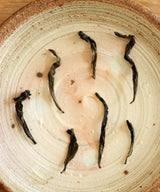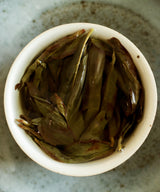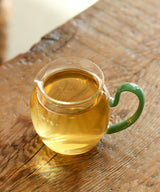Old Grove Buddha’s Hand Second Day Harvest 2019
老丛永春佛手 开山茶 2019
Harvest
April 2015
Origin
Tongmuguan, Fujian
Among oolongs, Yongchun Buddha’s Hand is truly unique. Although it is a shrub species, the leaves are large and thick – they really can be as large as the palm of your hand. As such, it asks for special handling both in cultivation and in preparation as a tea. Cultivate has been fortunate to make a friend in Yongchun, Fujian who is not only very aware of the history of tea in her native region, but is working to revive many of Yongchun's beautiful, traditional oolongs.
Our friend, Mei’s encounter with Yongchun oolong started in the summer of 2013, when she was visiting her university teacher in Anxi. In her teacher’s tea room she saw a tea labeled “1960’s Yongchun Buddha’s Hand.” Having never seen a tea like this before, she was very excited, but also felt ashamed by her ignorance of something that was once so treasured. Mei roughly understood that Yongchun Buddha’s Hand was a well known tea amongst older people in the region, but younger generations in Yongchun had no idea about the history of the tea or its traditional value. Mei was very touched by this brief encounter she had with Buddha’s Hand, and this motivated her to deepen her understanding of it.
Returning to Yongchun that summer, she began visiting the local mountains, looking for forgotten tea trees, particularly the Buddha’s Hand and Shuixian trees. She also visited local folk artists to learn more about the traditional culture and crafts of Yongchun in general. She quickly discovered that her relatively humble hometown had a profound cultural heritage.
For the past 9 years, Mei has trekked almost all of the mountains and peaks of Yongchun. She has come across abandoned tea trees deep in the mountains, and remote small scale tea farms that are still in operation. With amazement, she discovered that there are many abandoned Buddha’s Hand and Shuixian tea trees tucked high up in the mountain forests. Most of these groves are at least 2000 ft in elevation. Many of the tea trees are around 30 years old, but Mei has found some that are closer to 100: they have been hidden deep in the mountains, forgotten, and thus also protected.
The teas in this collection are teas from these old groves of tea trees that Mei has discovered on her treks in the mountains over the last decade. They are crafted by the generous and knowledgeable generational tea artisans who she has met in her hometown.
Mei came upon this old-grove of Buddha’s Hand tea trees in an old forest at the end of 2018. According to inhabitants of the mountain, the trees were planted in the 1940’s and, as their location was so difficult to get to, had been left to grow wild. Since being abandoned the trees have grown into what Mei describes as a “mini tea forest.”
Mei organized to harvest these trees for the first time since they were abandoned in the spring of 2019. Local Yongchun people have a name for this type of harvest: it is called 开山茶, or “Kaishancha.” The direct translation of Kaishancha is “open mountain tea,” or “opening the mountain for the first time,” meaning that the tea has experienced such an extensive period of time in the wilderness, a Kaishancha is like the first encounter with a tea tree and the initial foray into its grove. These wild teas, when harvested for the first time after a long period of rest, are understood to have a special quality.
The leaves for this tea are from the second day of the Kaishancha harvest. The tender, young leaves were collected by 9 local villagers, before the Qingming Festival. The tea leaves were then crafted following traditional techniques that originated in the mountain village.
There is no doubt that this tea is notably special. Beneath the usual, very pretty floral fragrance of Buddha’s Hand it carries a perfumed, woody scent. The tea is unusually rich and full-bodied: it spreads wide across the palate, and has a slippery, silky texture. The density of the liquor is balanced by the refreshing qualities we expect in a buddha’s hand. There is some hesitation to pull apart the tasting notes: this tea is so integrated, it feels as though it rests in a nameless category of its own.
As you drink it, you will notice that this tea provokes a strong salvation underneath your tongue, or demonstrates what is called “Shengjin.” This mouth watering effect is highly regarded, as Traditional Chinese medicine understands saliva to be a precious substance that prolongs life. Saliva contains a variety of compounds that are beneficial to our bodies, especially in promoting digestion and enhancing nutrient absorption. It also encourages us to taste more. In Chinese Medicine saliva is said to increase the vitality of the kidneys and spleen, and to strengthen the yin energy in the body. We will appreciate teas for calling it forth, and in doing so, preparing us to experience the most of them.






